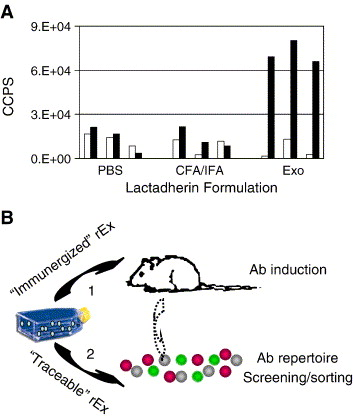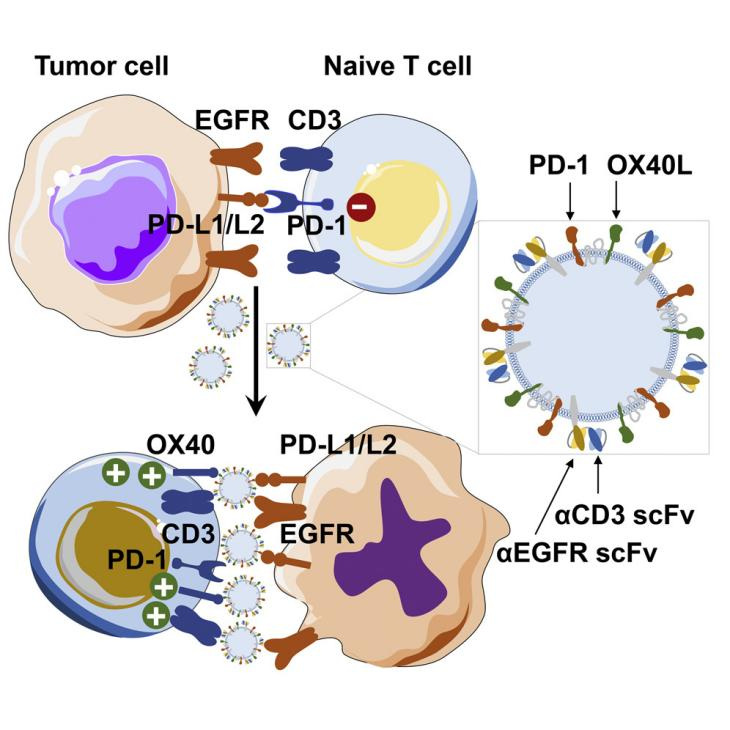Exosome Display-based Antibody Generation and Isolation (ExoMAb) Service
-
Exosomal antigen display construction
-
Antibody library screening (phage-based or immunization-based)
-
High-throughput selection and affinity validation
-
Antibody optimization, purification, and functional verification
-
✅ Phage Display Screening: High-affinity candidates are isolated using panning from large-scale libraries.
-
✅ Animal Immunization Screening: Exosomes are used to immunize animals (e.g., mice, rabbits), followed by hybridoma-based screening for high-affinity antibodies.
-
Therapeutic Antibody Development: Generation of monoclonal and bispecific antibodies against membrane protein targets (e.g., GPCRs, RTKs).
-
Diagnostic Antibody Discovery: Screening for antibodies targeting biomarkers of cancer, infectious diseases, and neurodegeneration.
-
Basic Research: Studying protein-protein interactions, signaling pathways, and membrane protein function.
-
Cell Therapy and Drug Discovery: Providing high-affinity antibodies to support CAR-T, TCR-T, and other immunotherapies.
-
Native-like Antigen Presentation: Exosome-based display retains native folding and post-translational modifications, crucial for screening antibodies against conformational and membrane-bound epitopes.
-
Physiologically Relevant Environment: Exosomes provide a cell-derived, membrane-rich context for screening, enhancing functional relevance compared to artificial phage systems.
-
Reduced False Positives: The optimized selection pipeline minimizes non-specific interactions, improving screening accuracy.
-
Better for Complex Targets: Unlike phage systems, ExoMAb reliably presents hydrophobic and transmembrane proteins, expanding the range of screenable antigens.
-
Better suited for complex targets such as hydrophobic or multi-pass proteins
Exosome Display-based Antibody Generation and Isolation (ExoMAb) Service uses exosomes as natural antigen carriers to provide efficient solutions for generating antibodies against transmembrane proteins and complex antigens. Compared with traditional phage display and hybridoma techniques, ExoMAb enables the selection of high-affinity and highly specific antibodies under conditions that better mimic the physiological environment, making it particularly suitable for difficult-to-express membrane proteins such as GPCRs and receptor tyrosine kinases. Leveraging mature exosome engineering, antibody screening platforms, and high-throughput mass spectrometry, MtoZ Biolabs offers end-to-end services covering antigen display on exosomes, antibody library screening, optimization, expression, and functional validation to support scientific and biomedical development.
Antibodies are indispensable tools in biomedical research, diagnostics, and therapy. However, traditional screening methods face significant limitations when targeting complex antigens such as membrane proteins. For instance, phage display struggles to preserve the native conformation of membrane proteins, and hybridoma techniques often suffer from low screening efficiency. Exosomes are nanoscale extracellular vesicles that naturally carry intact membrane proteins along with their post-translational modifications, making them ideal platforms for antigen presentation. ExoMAb technology modifies host cells through genetic engineering to express target proteins on exosome surfaces in their native conformation, enabling the identification of high-affinity and high-specificity antibodies.

Delcayre A, et al. Blood Cells Mol Dis.
Figure1. Application of Exosome Display to the Generation of Antibodies
Service at MtoZ Biolabs
Combining exosome engineering, antibody screening, and mass spectrometry, MtoZ Biolabs provides Exosome Display-based Antibody Generation and Isolation (ExoMAb) service to deliver high-efficiency and precision antibody development solutions. Our service encompasses exosomal antigen display, antibody library screening, high-throughput detection, antibody optimization, expression, and purification. This approach effectively addresses the challenges of developing antibodies against transmembrane proteins, low screening efficiency, and suboptimal antibody affinity. As a global leader in exosome-based services, we are committed to providing high-quality, translatable antibody discovery workflows to advance both research and therapeutic innovation.
Key components of the service include:
Analysis Workflow
MtoZ Biolabs' ExoMAb antibody generation and isolation service is based on a fully optimized exosome display system. The complete process spans from antigen expression to final antibody validation, with every step designed to ensure high affinity and specificity.
Step 1: Construction of a Stable Exosome Antigen Display Platform
Using genetic engineering, the target antigen is fused to exosomal membrane proteins (e.g., CD63, CD81), anchoring it firmly to the exosome surface. This ensures near-native conformation, facilitating precise antibody selection.
Step 2: Exosome Isolation and Characterization
Exosomes are extracted from engineered cells and enriched via ultracentrifugation, size exclusion chromatography (SEC), or polymer precipitation. We then perform nanoparticle tracking analysis (NTA) and transmission electron microscopy (TEM) to validate exosome integrity for downstream screening.
Step 3: Antibody Library Screening
This is the core of the ExoMAb workflow. We offer two screening approaches:
Step 4: Antibody Isolation and Optimization
Selected antibodies undergo validation for affinity and specificity using ELISA, flow cytometry (FACS), surface plasmon resonance (SPR), or bio-layer interferometry (BLI). We also offer affinity maturation to further improve binding strength.
Step 5: Antibody Purification and Functional Validation
Lead antibodies are purified via Protein A/G affinity and ion exchange chromatography, followed by in vitro and in vivo assays to evaluate biological functionality and ensure application-readiness.
Why Choose MtoZ Biolabs?
✅ Efficient Screening: Optimized selection strategies improve hit rates and reduce false positives.
✅ Broad Applicability: Ideal for insoluble or conformationally sensitive antigens such as transmembrane and glycoproteins.
✅ Precision Characterization: High-throughput screening combined with mass spectrometry ensures antibody specificity and quality.
✅ End-to-End Support: One-stop service from antigen design to functional validation.
Applications
ExoMAb technology supports a broad range of antibody discovery needs, including:
Case Study
Tumor cells often evade immune surveillance by suppressing host anti-tumor responses. While immune checkpoint blockade offers benefit, therapeutic responses remain limited in many patients. Exosomes, with their inherent biocompatibility and modifiability, represent promising delivery vectors for immunomodulatory agents.
In this study, researchers developed a multifunctional engineered exosome system using ExoMAb (Exosome-displayed Monoclonal Antibody) technology. By fusing single-chain variable fragments (scFv) to exosomal membrane proteins, exosomes were endowed with surface-expressed immunomodulatory molecules. These engineered exosomes were efficiently internalized by antigen-presenting cells, promoted dendritic cell maturation, activated CD8⁺ T cells and NK cells, and significantly enhanced anti-tumor immune responses in multiple mouse tumor models. The results suggest that ExoMAb-based engineered exosomes represent a safe, programmable, and potent cancer immunotherapy platform, holding promise for next-generation precision immunotherapies.

Cheng, Q. et al. Mol Ther. 2022.
Figure2. Eliciting Anti-Cancer Immunity by Genetically Engineered Multifunctional Exosomes
FAQs
Q1: Is ExoMAb suitable for all antigens?
A1: ExoMAb is particularly suited for membrane proteins and other complex antigens that are difficult to fold or express in traditional systems, such as GPCRs, RTKs, ion channels, and other multi-pass transmembrane proteins. These targets often lose native conformation in phage or yeast display systems, reducing antibody performance.
Q2: How does ExoMAb compare to traditional phage display?
A2: ExoMAb offers several advantages:
How to order?







